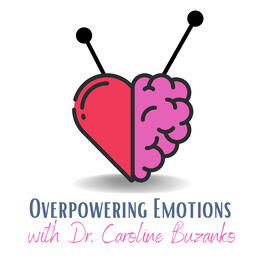
202. Are we ignoring the one thing that actually builds resilience?
Self-regulation isn’t just about teaching kids to “calm down.” It’s about what’s happening around them—the relationships, routines, and environments that shape how they manage emotions and reach goals. In this episode of #overpoweringemotions Dr. Caroline breaks down the often-overlooked elements that make or break self-regulation development: chaotic households, screen dependency, co-regulation pitfalls, and the surprising role of peers. If you're a parent, teacher, or clinician working with kids or teens, this one’s for you. We cover: • Why adult emotional regulation directly affects kids’ behavior • How co-regulation can backfire if you’re doing too much • The impact of adversity, screen time, and stress on kids’ brains • Why school and community settings are vital for real change • The difference between training toddlers and coaching teens Homework Ideas: Adult Self-Regulation Check-In Reflect on the past 3 days: • How did you respond to stress? • Did your kids or students see you calm down? • When did you yell, rush, or shut down? → Write down one pattern you want to shift. → Share it with a co-parent or colleague for accountability. Co-Regulation Inventory Use this to evaluate how you're supporting kids' emotional development. Be honest—this isn’t about guilt, it’s about growth. PART 1: Your Emotional Availability Over the past 3 days… ☐ Did I stay calm when my child/teen was upset? ☐ Did I model pausing and taking a breath? ☐ Did I respond with connection before correction? ☐ Did I name emotions without dismissing or fixing them? ☐ Did I let them feel uncomfortable without jumping to solve it? Reflection Prompt: When they were overwhelmed, did I show up in a way that made things feel safe—or more stressful?” PART 2: Your Habits That Might Be Getting in the Way Check any that apply: ☐ I often talk for my child when they’re upset ☐ I immediately distract or fix when they’re struggling ☐ I raise my voice when things escalate ☐ I jump in too fast instead of coaching them through ☐ I feel emotionally wiped out and lose patience quickly Try This Reframe: Instead of “How do I get them to calm down?” ask: “How do I help them build the skills to handle this next time?” PART 3: Skills to Strengthen Which of these could you practice this week? ☐ Allowing space for emotional expression ☐ Staying regulated in front of dysregulation ☐ Using fewer words when things escalate ☐ Validating their feelings—even if you don’t agree ☐ Practicing stress recovery yourself (sleep, food, rest) Personal Reflection * What pattern do I want to shift this week? * What usually triggers my reactivity? * What would support *me* in staying grounded? Coaching Phrase to Use This Week: “You don’t have to fix it right now. I’m here with you while we ride it out.” Collaboration Conversations Use the following tips and example scripts to create structure and routines without power struggles. Key goals: ✅ Reduce resistance ✅ Build autonomy ✅ Strengthen connection ✅ Support emotional regulation BEFORE YOU START: 3 Ground Rules 1. Stay calm and neutral 2. Assume good intentions 3. Make it feel like a team effort—not a lecture For Younger Children (Ages 5–10) Example Goal: Create a bedtime or morning routine Script Starter: “Hey buddy, mornings have felt kinda rushed lately. Can we come up with a plan together so it feels smoother for both of us?” Prompt Questions: * “What do you like doing first when you wake up?” * “What part is hardest for you?” * “Would it help to have a checklist or pictures?” * “Should we race the timer tomorrow and see if we can beat it?” Collaborative Statement: “Let’s pick 3 things you’ll do in order. I’ll help you remember until it’s a habit.” Tip: Let them draw or decorate their routine chart. Ownership = buy-in. For Tweens and Teens (Ages 11+) Example Goal: Homework + Screen Balance Script Starter: “You’re getting older, and I want you to have more say in how your time goes. Can we figure out a plan together so screens and homework don’t fight each other?” Prompt Questions: * “When do you feel most focused?” * “Would you rather work in one block or take breaks?” * “What’s something I should stop doing that makes it harder?” * “What’s a fair plan for screen time after work is done?” Collaborative Statement: “Let’s test this plan for a few days and tweak it if it’s not working. I want this to feel fair, not forced.” Boundaries Script: When They Resist Use this when things start to spiral: “I’m not here to control you. I want to figure this out together. I’m going to take a pause and we can try again when we’re both ready to work as a team.” Bonus Prompts for Any Age “What’s one thing that would make \[school mornings / bedtime / dinner time] better?” “What do you want to have control over here?” Let’s pick one small thing to try this week. You pick it.” Enjoying the show? Help out by rating this podcast on Apple to help others get access to this information too! apple.co/3ysFijh Follow Dr. Caroline YouTube: https://www.youtube.com/@dr.carolinebuzanko IG: https://www.instagram.com/dr.carolinebuzanko/ LinkedIn: https://ca.linkedin.com/in/dr-caroline-buzanko Facebook: https://www.facebook.com/DrCarolineBuzanko/ X: https://x.com/drcarolinebuz Website: https://drcarolinebuzanko.com/ Resources: https://drcarolinebuzanko.com/#resources Business inquiries: https://korupsychology.ca/contact-us/ Want to learn more about helping kids strengthen their emotion regulation skills and problem-solving brains while boosting their confidence, independence, and resilience? Check out my many training opportunities! https://drcarolinebuzanko.com/upcoming-events/
From "Overpowering Emotions Podcast: Helping Children and Teens Manage Big Feels"


Comments
Add comment Feedback